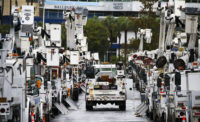Sued for wrongful termination, the South Florida Water Management District filed a countersuit May 30 in a southern Florida federal court, refuting claims brought by a Lane Construction Corp.-Webuild joint venture after it was terminated as contractor for the half-billion-dollar Caloosahatchee Reservoir (C-43) in Hendry County.
C43 Water Management Builders, the Lane-led joint venture with partner and Rozzano, Italy-based parent company Webuild SpA, was terminated April 28 for material breach of contract after the agency said the contractor could not stay on schedule and would not take necessary steps to get back on schedule or prevent further delays.
The contractors, who contend they were not in breach of the contract, are suing for wrongful termination and for a termination for default notice to be rescinded, so it does not affect the firms from performing work in Florida and elsewhere. The companies contend the agency did not provide extra time they were entitled to complete work, and that at least 322 days of delay are attributable to agency, not contractor, actions.
In response, the district's complaint asks for damages in excess of $50,000, along with attorney fees and other costs, saying the contractors did breach the contract “by failing to prosecute the work with promptness and diligence,” failing to maintain enough workers, materials and equipment, failing to submit an appropriate recovery plan and more.
As a result, the filing says, “the District, and the taxpayers it represents, has suffered and will continue to suffer damages, including, without limitation, compensatory damages, consequential damages, damages for delay, liquidated damages and other related damages from Contractor’s breach.”
Completing the project is a top priority, and the contractor failed to stay on schedule and chose not to make the necessary changes to restore the schedule and prevent further delays, says Sean Cooley, the agency's chief communications officer.
“Florida taxpayers should not be on the hook for additional costs now associated with completing the project and we’ve taken action to recover these additional costs,” he says in a statement. “We’re going to continue delivering on the commitments we’ve made to improve our region’s water resources while protecting the taxpayers’ investments in these projects.”
Part of Florida’s Comprehensive Everglades Restoration Plan, the 10,500-acre reservoir will hold approximately 170,000 acre-ft of water with a maximum depth of up to 25 ft, to capture and store excess harmful stormwater runoff and harmful fresh water discharged from Lake Okeechobee. The district says work continues on the reservoir.
The filing says the project was designed to be delivered in four major construction packages. The first three packages were performed by other contractors. At issue is the fourth, which includes constructing a two-cell reservoir, approximately 19 miles of dam embankment, 15 miles of perimeter canal, 14 major water control structures, recreation features, Townsend Canal improvements and local and site access bridges.
In a statement to ENR, Lane says the district, not contractor, caused the delays and cost overruns.
"The District's actions are unfortunately consistent with their history of ill-conceived terminations on this project and others," the statement says. "Unfortunately, taxpayers will bear the financial impacts of the District's decision to wrongfully terminate WMB as the completion costs will greatly exceed the contract value that WMB locked in with its bid in 2019 prior to COVID."
Original estimates for the work were between $635 million and $704.5 million, with bids received ranging from the JV's low bid of $523.8 million to the highest of almost $880 million.
The bid was roughly $168 million below the next-lowest bid. On March 14, 2019, the district's Governing Board questioned Michael Cote, Lane's executive vice president, as to why the bid was so much lower than the other, according to the filing, and Cote stated it was accurate and that the firms stood by it, and the board approved entering into the contract.
That contract, according to the filing, stipulated that work be completed Dec. 23, 2023, 1,664 days following the May 31, 2019, notice to proceed, but the agency says work didn’t start until that Sept. 15, and the contractor was unable to maintain its schedule, submitting its first and only recovery plan in September 2020.
The lawsuit says the team “immediately failed to adhere to its own recovery plan,” and a new project director began working on the project a year later.
“From that point forward, Contractor submitted an extremely unusual avalanche of letters and poorly documented claims for more revenues and time,” the suit alleges, which totaled more than $285.3 million and 2,050 days.
As the contractor and district corresponded through the end of 2022 and beginning of 2023, the JV detailed three examples where it says the district was the cause of delays, which it addresses in its filing—namely design changes to a structure, design changes to the blanket drain and a problem with accessing the site from delays to work on Bid Package 3.
The district claims those changes did not require additional construction time, and design changes to the blanket drain reduced the scope of work and that the contractors did have access to the Bid Package 3 area.





Post a comment to this article
Report Abusive Comment